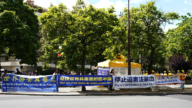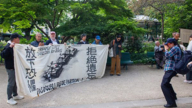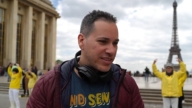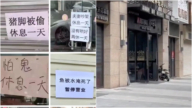星期四(12月3日)凌晨,英國國會通過對恐怖組織「伊斯蘭國」(ISIS)在敘利亞佔領地進行空襲的動議。隨後,英國國防部派遣4架戰機,對ISIS實施了首次轟炸。
英國通過這項動議,並非輕易之舉,無論是在坊間還是政治人物中,對於是否應該轟炸「伊斯蘭國」在敘利亞的大本營拉卡等地,都存在著很大分歧。
動議通過之前,英國議會進行了長達約10個小時的辯論,直到反對黨工黨影子外交大臣Hilary Benn的一席話,最終促使決議通過。他鄭重的告訴所有在場議員:
「我們永遠不能,也不應選擇逃避」
「我們現在必須直面這個惡魔」
(We must now confront this evil)
英國議會討論過程回顧
英國首相卡梅倫稱,空襲ISIS是正確決定,將令英國更安全。並表示空襲敘利亞符合英國的國家利益,因為IS已經對全球安全造成嚴重威脅。
英國首相卡梅倫:「恐怖組織目前正在籌劃以各種形式,對我們進行襲擊。他們還用這種所謂的激進思想,給英國的青少年進行洗腦。我們的國家正在面臨在安全威脅,我們國家有必要剷除ISIS。」
「英國不能坐以待斃,讓恐怖組織ISIS來攻擊我們!」
然而,反對黨英國工黨下議院議員傑瑞米,對於轟炸ISIS提出質疑。
英國工黨下議院議員傑瑞米:「轟炸ISIS在敘利亞佔領的領地,平民也會傷亡。」
「就算ISIS被轟炸而退場,如果ISIS地盤被7萬名敘利亞反政府軍佔領了,又該怎麼辦?」
「空襲ISIS,只能讓恐怖分子更仇恨英國;相反,如果英國被恐襲的可能性提高了,該怎麼辦?」
異議一提出,便受到同黨派議員的反對。提出異議的工黨議員Jeremy Bernard Corbyn,被同黨派議員質疑縱容ISIS行惡。
英國首相卡梅倫稱,英國已經在伊拉克對恐怖組織ISIS的佔領地,進行了一年零三個月的轟炸,目前無一平民傷亡。辯論進行的如火如荼。這時,反對黨工黨影子外交大臣Hilary Benn則表示,
「我們永遠不能,也不應選擇逃避」
「我們現在必須直面這個惡魔」
(We must now confront this evil)
Hilary Benn:「現在,我們面對的不是ISIS,而是一整個法西斯主義!不只是他們殘忍的暴行,他們凌駕在我們這間房子裡的任何人之上。」
「他們蔑視著我們每一個人。蔑視我們的信仰,蔑視我們的價值觀,蔑視我們的容忍度,蔑視我們的高尚,更蔑視了我們引以為豪的民主制度。」
「最近,我們又發現了一個大型的屍體填埋坑,裡面的屍體全部都是ISIS認為年紀太老,而不能變賣的婦女。我們就更不用再提突尼西亞死去的30個英國遊客、224名命喪俄國客機的乘客、在貝魯特和安卡拉,被自殺炸彈奪取的178名冤魂,和巴黎襲擊裡的130個死難者了。」
「法西斯主義的殘暴,我們每一個人都領教過了。這就是為什麼,當年國際縱隊要站起來對抗西班牙的弗朗哥。這就是為什麼,當年這間房子里的每一個人都決定站起來,對抗希特勒,對抗墨索里尼。這就是為什麼,我們的工黨決定抵抗一切反人權,反正義的行為。這就是為什麼,在我們又一次遇到了ISIS這樣的法西斯的時候,我們要徹底打敗他們!」
「我真切的請求我工黨的每一位同胞,支持對方今晚的決定。」
「我們都已經知道ISIS是惡魔了,那麼我們還不應該跟法國人一起並肩作戰,對抗他們嗎?」
「我們現在必須直面這個惡魔了!」
Hilary Benn的部分發言視頻:
英國議會最終以397對223票通過了對恐怖組織ISIS展開空襲的動議。幾小時後,4架旋風式戰機(Tornado)便從英國空軍位於塞浦路斯的阿克洛迪瑞(Akrotiri)基地起飛,飛往敘利亞進行轟炸任務。經國防部發言人證實,這些戰機已經完成對ISIS進行的第一次轟炸任務並返航。
Hilary Benn發言完整視頻及文字全文如下:
Thank you very much Mr Speaker. Before I respond to the debate, I would like to say this directly to the Prime Minister: Although my right honourable friend the Leader of the Opposition and I will walk into different division lobbies tonight, I am proud to speak from the same Despatch Box as him. My right honourable friend is not a terrorist sympathiser, he is an honest, a principled, a decent and a good man and I think the Prime Minister must now regret what he said yesterday and his failure to do what he should have done today, which is simply to say ‘I am sorry’.
Now Mr Speaker, we have had an intense and impassioned debate and rightly so, given the clear and present threat from Daesh, the gravity of the decision that rests upon the shoulders and the conscience of every single one of us and the lives we hold in our hands tonight. And whatever we decision we reach, I hope we will treat one another with respect.
Now we have heard a number of outstanding speeches and sadly time will prevent me from acknowledging them all. But I would just like to single out the contributions both for and against the motion from my honourable and right honourable friends the members for Derby South, Kingston upon Hull West and Hessle, Normanton, Pontefract and Castleford, Barnsley Central, Wakefield, Wolverhampton South East, Brent North, Liverpool, West Derby, Wirral West, Stoke-on-Trent North, Birmingham Ladywood and the honourable members for Reigate, South West Wiltshire, Tonbridge and Malling, Chichester and Wells.
The question which confronts us in a very, very complex conflict is at its heart very simple. What should we do with others to confront this threat to our citizens, our nation, other nations and the people who suffer under the yoke, the cruel yoke, of Daesh? The carnage in Paris brought home to us the clear and present danger we face from them. It could have just as easily been London, or Glasgow, or Leeds or Birmingham and it could still be. And I believe that we have a moral and a practical duty to extend the action we are already taking in Iraq to Syria. And I am also clear, and I say this to my colleagues, that the conditions set out in the emergency resolution passed at the Labour party conference in September have been met.
We now have a clear and unambiguous UN Security Council Resolution 2249, paragraph 5 of which specifically calls on member states to take all necessary measures to redouble and co-ordinate their efforts to prevent and suppress terrorist acts committed specifically by Isil, and to eradicate the safe haven they have established over significant parts of Iraq and Syria.
So the United Nations is asking us to do something. It is asking us to do something now. It is asking us to act in Syria as well as in Iraq. And it was a Labour government that helped to found the United Nations at the end of the Second World War. And why did we do so? Because we wanted the nations of the world, working together, to deal with threats to international peace and security – and Daesh is unquestionably that.
So given that the United Nations has passed this resolution, given that such action would be lawful under Article 51 of the UN Charter – because every state has the right to defend itself – why would we not uphold the settled will of the United Nations, particularly when there is such support from within the region including from Iraq. We are part of a coalition of over 60 countries, standing together shoulder-to-shoulder to oppose their ideology and their brutality.
Now Mr Speaker, all of us understand the importance of bringing an end to the Syrian civil war and there is now some progress on a peace plan because of the Vienna talks. They are the best hope we have of achieving a cease-fire. That would bring an end to Assad’s bombing, leading to a transitional government and elections. And why is that vital? Both because it will help in the defeat of Daesh, and because it would enable millions of Syrians, who have been forced to flee, to do what every refugee dreams of: they just want to be able to go home.
Now Mr Speaker, no-one in this debate doubts the deadly serious threat we face from Daesh and what they do, although sometimes we find it hard to live with the reality. We know that in June four gay men were thrown off the fifth storey of a building in the Syrian city of Deir ez-Zor. We know that in August the 82-year-old guardian of the antiquities of Palmyra, Professor Khaled al-Assad, was beheaded, and his headless body was hung from a traffic light. And we know that in recent weeks there has been the discovery of mass graves in Sinjar, one said to contain the bodies of older Yazidi women murdered by Daesh because they were judged too old to be sold for sex.
We know they have killed 30 British tourists in Tunisia, 224 Russian holidaymakers on a plane, 178 people in suicide bombings in Beirut, Ankara and Suruc. 130 people in Paris including those young people in the Bataclan whom Daesh – in trying to justify their bloody slaughter – called ‘apostates engaged in prostitution and vice’. If it had happened here, they could have been our children. And we know that they are plotting more attacks.
So the question for each of us – and for our national security – is this: given that we know what they are doing, can we really stand aside and refuse to act fully in our self-defence against those who are planning these attacks? Can we really leave to others the responsibility for defending our national security when it is our responsibility? And if we do not act, what message would that send about our solidarity with those countries that have suffered so much – including Iraq and our ally, France.
Now, France wants us to stand with them and President Hollande – the leader of our sister socialist party – has asked for our assistance and help. And as we are undertaking airstrikes in Iraq where Daesh’s hold has been reduced and we are already doing everything but engage in airstrikes in Syria – should we not play our full part?
It has been argued in the debate that airstrikes achieve nothing. Not so. Look at how Daesh’s forward march has been halted in Iraq. The House will remember that, 14 months ago, people were saying: ‘they are almost at the gates of Baghdad’. And that is why we voted to respond to the Iraqi government’s request for help to defeat them. Look at how their military capacity and their freedom of movement has been put under pressure. Ask the Kurds about Sinjar and Kobani. Now of course, air strikes alone will not defeat Daesh – but they make a difference. Because they are giving them a hard time – and it is making it more difficult for them to expand their territory.
Now, I share the concerns that have been expressed this evening about potential civilian casualties. However, unlike Daesh, none of us today act with the intent to harm civilians. Rather, we act to protect civilians from Daesh – who target innocent people.
Now on the subject of ground troops to defeat Daesh, there’s been much debate about the figure of 70,000 and the government must, I think, better explain that. But we know that most of them are currently engaged in fighting President Assad. But I’ll tell you what else we know, is whatever the number – 70,000, 40,000, 80,000 – the current size of the opposition forces mean the longer we leave taking action, the longer Daesh will have to decrease that number. And so to suggest, Mr Speaker, that airstrikes should not take place until the Syrian civil war has come to an end is, I think, to miss the urgency of the terrorist threat that Daesh poses to us and others, and I think misunderstands the nature and objectives of the extension to airstrikes that is being proposed. And of course we should take action. It is not a contradiction between the two to cut off Daesh’s support in the form of money and fighters and weapons, and of course we should give humanitarian aid, and of course we should offer shelter to more refugees including in this country and yes we should commit to play our full part in helping to rebuild Syria when the war is over.
Now I accept that there are legitimate arguments, and we have heard them in the debate, for not taking this form of action now. And it is also clear that many members have wrestled, and who knows, in the time that is left, may still be wrestling, with what the right thing to do is. But I say the threat is now, and there are rarely, if ever, perfect circumstances in which to deploy military forces. Now we heard very powerful testimony from the honorable member for Eddisbury earlier when she quoted that passage, and I just want to read what Karwan Jamal Tahir, the Kurdistan regional government high representative in London, said last week and I quote: ‘Last June, Daesh captured one third of Iraq over night and a few months later attacked the Kurdistan region. Swift airstrikes by Britain, America and France, and the actions of our own Peshmerga, saved us. We now have a border of 650 miles with Daesh. We’ve pushed them back, and recently captured Sinjar. Again, Western airstrikes were vital. But the old border between Iraq and Syria does not exist. Daesh fighters come and go across this fictional boundary.’ And that is the argument Mr Speaker, for treating the two countries as one, if we are serious about defeating Daesh.
Now Mr Speaker, I hope the house will bear with me if I direct my closing remarks to my Labour friends and colleagues on this side of the House. As a party we have always been defined by our internationalism. We believe we have a responsibility one to another. We never have – and we never should – walk by on the other side of the road.
And we are here faced by fascists. Not just their calculated brutality, but their belief that they are superior to every single one of us in this chamber tonight, and all of the people that we represent. They hold us in contempt. They hold our values in contempt. They hold our belief in tolerance and decency in contempt. They hold our democracy, the means by which we will make our decision tonight, in contempt. And what we know about fascists is that they need to be defeated. And it is why, as we have heard tonight, socialists and trade unionists and others joined the International Brigade in the 1930s to fight against Franco. It’s why this entire House stood up against Hitler and Mussolini. It is why our party has always stood up against the denial of human rights and for justice. And my view, Mr Speaker, is that we must now confront this evil. It is now time for us to do our bit in Syria. And that is why I ask my colleagues to vote for the motion tonight.
新唐人加拿大編輯部





























